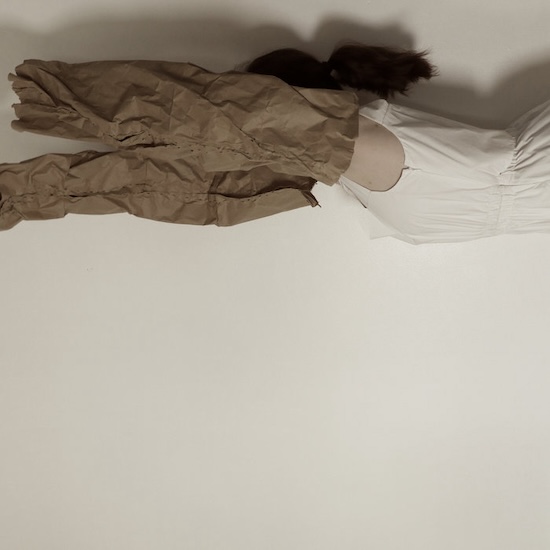doggerLANDscape by French-born British composer/artist Olivia Louvel is a rather expansive project which manifests as exhibited sound mural, video art, printed image and composition. The video is awash with beautiful, flat coastal images and deadpan narration, but here we’ll concentrate on the album itself. The record is described as containing ‘songs’, but actually we might think of them as something else that resonates with sound art principles, acousmatic music, poetry, soundscape, ambient music, and song. And it’s an interesting journey for sure.
Doggerland is the portion of the Earth’s crust that connects the UK to mainland Europe from the east coast of England and the Netherlands and the fringes of Jutland. It is this connection that Louvel mines to ask questions about the UK identity of islander status. An ideological and/or practical position that has been cultivated since the drowning of the land some 8,000-plus years ago. It seems in a post-Brexit UK, Louvel is keen to explore and critique political isolationism, and what we might think of as the post-colonial essentialism still clung to by the key architects and supporters of the Brexit mindset. It is a difficult time for the union. Tensions in the north of Ireland, movement towards Scottish independence, and a rise in both Welsh and Cornish nationalism are all part of the soup of political identity of the British Isles, and it is into this soup that Louvel willingly pours her work.
The opening statement of the album is ‘We Are One Land’ a sort of mystical drone piece with human voice and what sounds like a brass instrument (which may also be a voice) overlaid with poetic narration and low percussive strikes that sink in pitch, like the plane mudflats of our present topography. The production is subtle and careful, and the shape of the piece seems to speak both to a sense of visual scene and geological matter.
As we move from this to ‘Doggerland DNA’ things become heavier and darker. The long, drawn-out tones are more dissonant, the use of reverb more cavernous and strange. This track builds from two statements, “my wife and I had our genetic profiles done” and “I want my land back, my ancestral home is now underwater.” There is apparent thunder and wind and wave-like washes. We also get throat singing too, and I am reminded of the current cultural interest in Norse or Viking culture. Thankfully this is far more diligent and thoughtful than much of that stuff.
‘Understand the landscape’ is a highlight for me. It is richer still than what precedes it, and despite the huge amount of delay, we have access to real detail, distortion, gravelly timbres, dirt, rhythm and darkly consuming depth. It is perhaps the most complex piece here, but it is also the most successfully structured, having much to do with acousmatic traditions. The dynamics are challenging and it feels absolutely complete and composed. And while subjectively I could happily live without all the delay, it is a hugely impressive composition. It is not for nothing that Louvel’s career is littered with awards.
This quality is maintained through ‘I Extend My Arms Across the North Sea’ which is the most song-like of the things on offer but reaches the listener as a glitchy, wilfully experimental sort of electronica. The throat singing returns and provides a sort of percussive bassline. It’s great.
As we move on, moving back toward more ambient, reverb-driven vocal pieces, it becomes clear that the composer is working with what is actually quite a constrained palette here, and that is by no means a criticism. The pieces all belong to each other, and that might be considered a theme. The principle of connectedness, shrouded only by water, means that any compositional response must in fact, remain part of a compositional whole. Simple perhaps, but convincing. ‘On The Shoreland On That Day’ articulates the geological history of Louvel’s chosen site (we might think of all of this as a kind of site-specific work). It is cold and glacial. We can hear the cracking and groaning of the land sounded large here.
There is of course the prescient notion that we are now losing land and ice due to environmental change. What further ideological shifts of isolationism or togetherness might we encounter as the face of our planet changes? And how will we cope with these losses? The final track of the album is a roughly ten-minute spoken word piece (though it retains the compositional quality of the rest of the record, but I suppose it functions as a kind of useful index to the rest of the record. The fragments of the composer’s notebooks or journals provide an insight to where this comes from in both material and thinking.
This is a very hard album to write about briefly, and I should like to write a good deal more than I have. But to try and summarise doggerLANDscape is a taut, charged and insightful collection that poses significant questions, at least in my mind, about political identity, ideological and material borders, and the ways in which our geological environments shape our lives and thinking. And this at a time where we should perhaps all be questioning this a great deal. Upon what rock do we stand, and what might it mean to do so?


